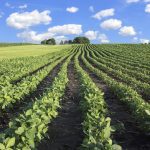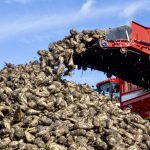
Can Canada make up for a shortfall of grain from Ukraine?
Opportunities, limitations, and long-term considerations

Editorial: Prevention is better than the cure

USDA crop reports surprise analysts
Despite export ban from Ukraine, there hasn’t been an increase in export demand for U.S. corn and wheat

Farmland at risk with new housing initiative
Accelerated approval for housing developments concerns agriculture and environmental groups

Kinze planter bumps speed limit to 12 m.p.h.
The unit’s seed singulation ability ‘sounds like a machine gun,’ says Kinze representative

Funding announced to revive wool market
The Canadian Wool Council hopes to set a new direction for the natural fibre

Will war open Europe to biotechnology?
Severe supply disruptions have prompted some member states to consider wider acceptance of GM crops

Food waste put to use in formula to boost root growth, sugar content
Nurture Growth uses microbes from waste to let plants fix their own nitrogen

Motivating and managing employees for farm markets
Pandemic pressures taught farm market businesses lessons on employee engagement and retention

Comment: Better approach needed for soil health
Farmers need support from those who ask them to do more


